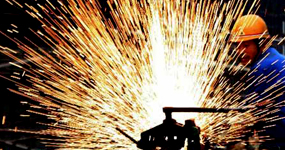
中国经济一季度增长提速,达到11.9%,突显出中国正从全球经济危机中迅速复苏,但同时也引发了经济可能过热的新问题。
一季度增长率创下了近三年来的新高,超出了经济学家此前的预期。如此迅速的经济增长,给中国政府带来了新压力,迫使其考虑出台更严厉的紧缩措施,包括人民币升值和加息。
在一季度国内生产总值(GDP)数据公布前一天,中国政府透露,过去12个月房价的涨幅为11.7%,为5年前首次公布该数据以来的最大涨幅,由此引发了人们对于房地产市场可能存在泡沫的新忧虑。
尽管市场对经济过热担忧日益加剧,但3月份的居民消费价格指数(CPI)却从2月份的2.7%降至2.4%。不过,出厂价格指数继续加速增长,从5.4%升至3月份的5.9%。
“在外部需求没有急剧下滑的背景下,政府必须比以往更加坚决的收紧政策,以防经济过热,这一点至关重要。”高盛(Goldman Sachs)的宋宇和乔虹(Helen Qiao)在向客户提交的一份报告中表示。
尽管在一定程度上,一季度经济数据是对去年同期经济低迷的反映,但环比增长同样强劲。高盛的数据显示,经季节性因素调整后,中国经济较去年第四季度增长11.3%。
Stone & McCarthy驻北京经济学家汤姆•奥尔利克(Tom Orlik)表示,(中国的)增长看上去更为均衡,对公共投资的依赖程度下降,而更多地依赖消费和海外需求。但他补充称,“由于目前增长强劲,同时总体通胀率仍较为温和,给政府提供了一个机会窗口,在政策刺激手段变得过度之前加以控制。”
中国政府已经采取了一些措施,以弱化此前采取的经济刺激手段,包括在3月大力收紧对银行贷款的控制。然而,就在国内对通胀抬头感到关切之际,中国所面临的要求其放弃实际上盯住美元的汇率政策的国际压力正不断加大。
译者/何黎
http://www.ftchinese.com/story/001032220

The Chinese economy expanded at an accelerated rate of 11.9 per cent in the first quarter, underlining the rapid recovery from the global economic crisis but raising new questions about the risks of overheating.
The economy grew at the fastest rate in nearly three years and more quickly than economists had expected. The pace of growth puts new pressure on Beijing to consider tougher tightening measures, including appreciating the exchange rate and increasing interest rates.
The first quarter GDP figures came out a day after the government revealed that housing prices increased by 11.7 per cent over the last 12 months, the fastest rate since the figures were first published five years ago and prompting new concerns about a potential bubble in the property market.
Despite rising fears of overheating, consumer price inflation dipped to 2.4 per cent last month, from 2.7 per cent in February. However, factory-gate inflation continued to accelerate, increasing from 5.4 per cent to 5.9 per cent in March.
“In the absence of a dramatic fall in external demand, it is critical for the government to tighten policy more decisively than they have been doing in order to prevent overheating,” said Yu Song and Helen Qiao at Goldman Sachs in a report to clients.
Although the first quarter numbers reflected in part the slump in the economy at the same time last year, sequential growth was also strong. The economy grew 11.3 per cent from the fourth quarter on a seasonally adjusted basis, Goldman Sachs said.
Tom Orlik, an economist at Stone & McCarthy in Beijing, said that growth appeared to be more balanced, relying less on public investment and more on consumption and foreign demand. But he added that “with growth now strong and headline inflation still subdued, the government has a window of opportunity to rein in the policy stimulus before it tips over into excess”.
The government has already taken some steps to reduce the stimulus it is injecting into the economy, including much tighter control over bank lending in March. However, domestic concerns about potential inflation come at a time of growing international pressure to abandon China's de facto currency peg against the US dollar.

没有评论:
发表评论